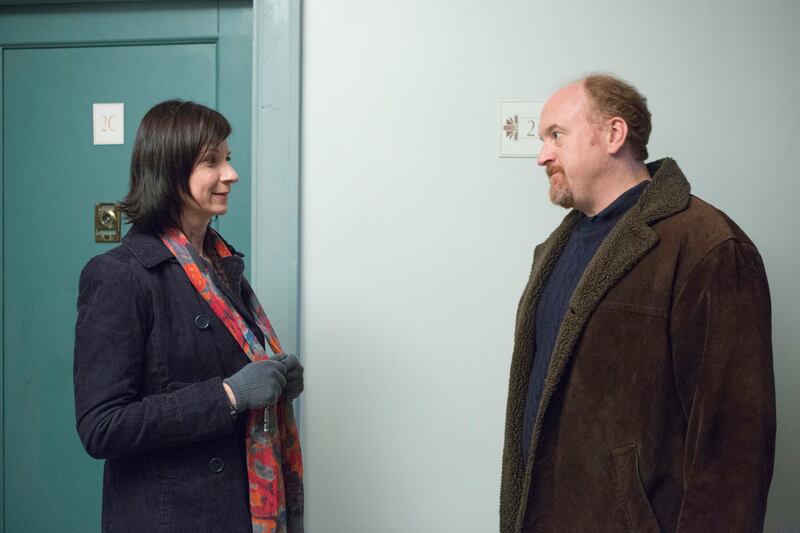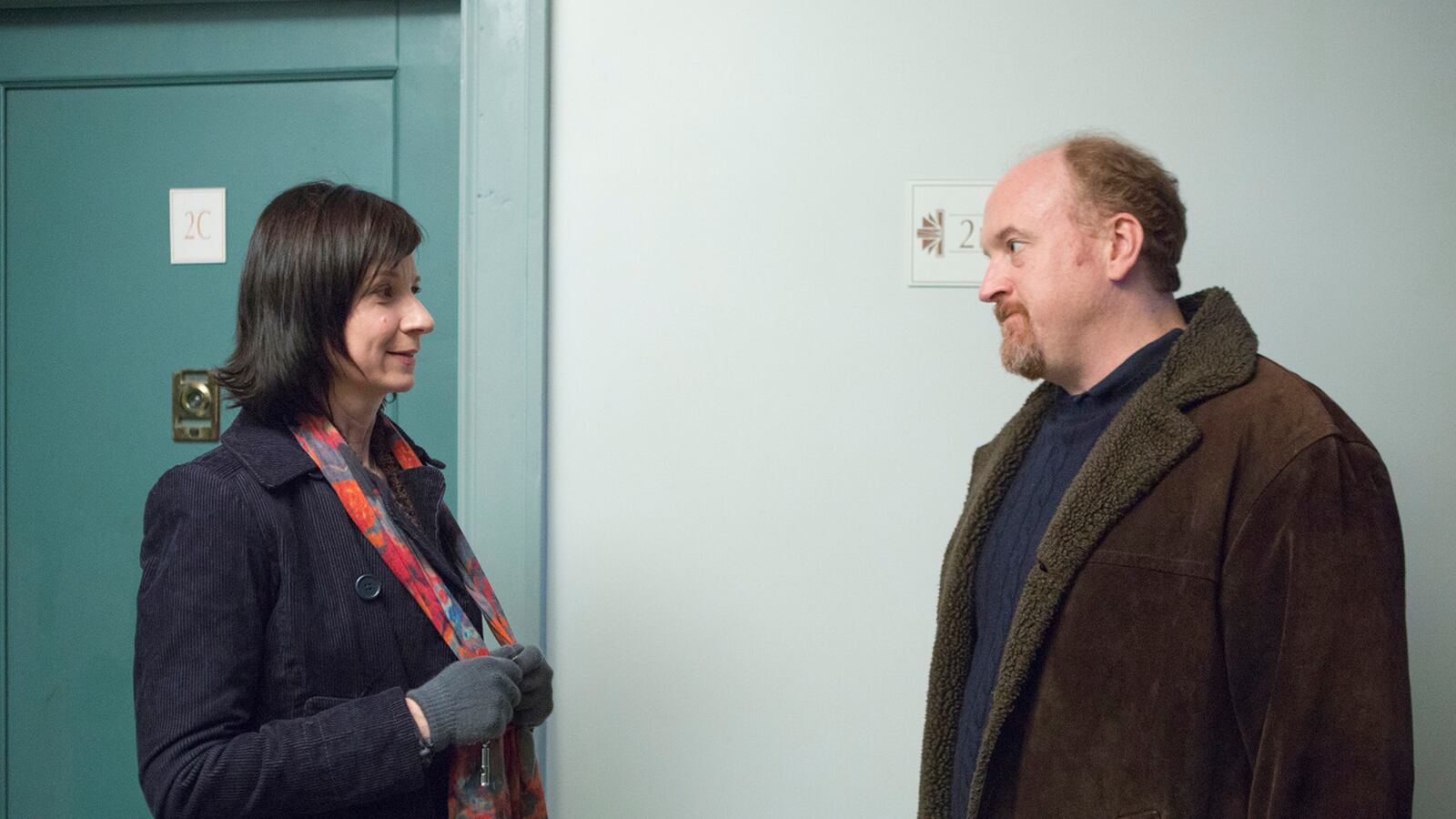Most relationships between straight men and women in entertainment are plunked into two, completely separate categories: romantic and purely platonic. Anything that falls outside of those two categories tends to be treated like a problem to be fixed, instead of a relationship in its own right. Movies like Friends with Benefits and When Harry Met Sally suggest that people whose relationships might be sexual or flirty without being full-blown love affairs, inevitably resolve with the couples deciding to commit to traditional monogamous relationships. It is, apparently, better than a non-defined limbo space.

As he is wont to do, Louis C.K. used his show Louie to interrogate this notion that men and women are either fully on or fully off, with nothing in between. In a five-part arc on his sitcom titled “Elevator,” C.K. tells the story of the main character, named Louie, befriending a Hungarian woman in his apartment building, despite the fact that she speaks no English and he speaks no Hungarian. Using her aunt as a translator, he discovers that his friend, named Amia, is returning to Hungary soon and cannot stay in the U.S., but they agree that they enjoy hanging out and spend the next few episodes doing so.
That Louie and Amia are romantically interested in each other is obvious from the get-go, so much so that he blows off a woman he previously had a crush on because, he tells her, he’s seeing someone. Despite being unable to communicate much, they have rapport and everyone around them believes they are dating. His ex-wife Janet even accuses Louis of being in love, a charge he doesn’t deny.
There’s just one wrinkle: While Louie and Amia are definitely flirting and possibly dating, they aren’t having sex. It’s not because they’re taking it slow, however, because they aren’t even really kissing or engaging in any other sexual interactions. This bothers everyone who finds out about it. Janet suggests that Louie is a failure, declaring, “Can’t you just learn to live a life already?” Amia’s aunt concurs, announcing loudly, “If you don’t screw the cow, the cow is not yours!”
But even though Louie never really articulates why he and Amia aren’t having sex, despite their obvious attraction, the smart viewer sees that there are some pretty good reasons why. She’s leaving soon. They don’t share a language in common. While both these things wouldn’t matter if it was just a casual fling, the fact that both of them clearly has feelings for the other means that sex would feel meaningful and important. How do you work through all the complicated feelings about having a brief but meaningful affair when you can’t even talk about what you’re feeling?
Louie is bowed by all this pressure and, in a moment of weakness, does end up seducing Amia. The result is exactly everything he had reason to fear: In the morning, she wakes up and tries to explain, in Hungarian, why she is not happy about things. But he doesn’t understand, so she leaves with the phrase “not good” and no further information. Was he bad in bed? Did she regret it? What exactly is her issue? Turns out that Jason Derulo is wrong, and the booty does need explaining.
But beyond just this particular set of circumstances, the show asks a bigger question: Why do we need to shove every relationship into a narrowly defined box? Louie and Amia were perfectly happy to drift along, batting eyes at each other but never taking it to the next level. It was only the people around them who were so uncomfortable with a non-traditional relationship that they were willing to overlook the serious drawbacks and instead pressure these two into a sexual relationship they were otherwise reluctant to have.
The storyline really exposed how much there’s a “script” that people are expected to follow: Meet someone, fall for them, consummate it by having sex, and make a commitment to be monogamous until you either break up or one of you dies. Relationships that fall outside of that script are strongly policed and people in them are routinely pressured to mold their unusual bond to the norm. Yes, C.K. seems to be arguing, even when it’s screamingly obvious that the standard “relationship” script is not going to work for a particular twosome and may in fact be emotionally dangerous.
In his argument over Amia with his wife, Louie plaintively contends that it’s enough that everyone is happy right now—that he and his daughters are enjoying Amia’s company—and not everything has to be made more than it is. He argues that even if a relationship is temporary or hard to define, it can often be enriching to experience it on its own terms, without needing it to go anywhere or fit a mold that everyone else is comfortable with. She counters with the argument that his daughters need stability. But it’s hard to shake the feeling that she’s just using “the children” as a cover to force every relationship into an easily understood mold. “Ex-husband’s girlfriend” is a relationship that has set social rules and ways to understand it. “Ex-husband’s kinda girlfriend temporary best friend” is harder to navigate, and Janet wants Louie to choose her comfort over his happiness.
The truth of the matter is there are a lot of relationships that fall outside of the discrete boxes of “purely platonic” and “heading for a committed, monogamous relationship.” College kids are given a little room to be flexible with ambiguous phrases like “friends with benefits” or “hooking up”—which can mean anything from kissing to intercourse—but once you graduate from college and join the “real” world, you are expected to mold your relationships to fit these very narrow norms. In some more conservative parts of the country, even couples who live together without moving toward marriage provoke a kind of ugliness, with people always asking when they intend to get married or, in a worst-case scenario, actually book a wedding space for you in hopes you’ll cave and just use it.
But, as Louie showed, even in liberal urban areas like New York City, you often find that while people are slightly more flexible—they don’t expect every couple to get married after exactly 2 years of dating—there are still a thousand unspoken rules about what your relationships are supposed to look like. People still end up having relationships out of the norm, such as temporary relationships or romantic relationships that aren’t heading for sex or non-monogamous relationships. But often they simply conceal their activities from friends and family, rather than put up with a lot of nosy questions.
What if it didn’t have to be that way, Louie asks? Unfortunately for the character Louie, however, he’s in a sitcom and therefore destined to let human foibles overwhelm him for the viewing pleasure of the audience. He tries to shove his relationship with Amia into a box and that box explodes in his face. But we out in the audience have a chance to think it over and, maybe, just try to be a little more understanding that love comes in all sorts of shapes and sizes and may not fit exactly what we’re taught it’s supposed to be.





